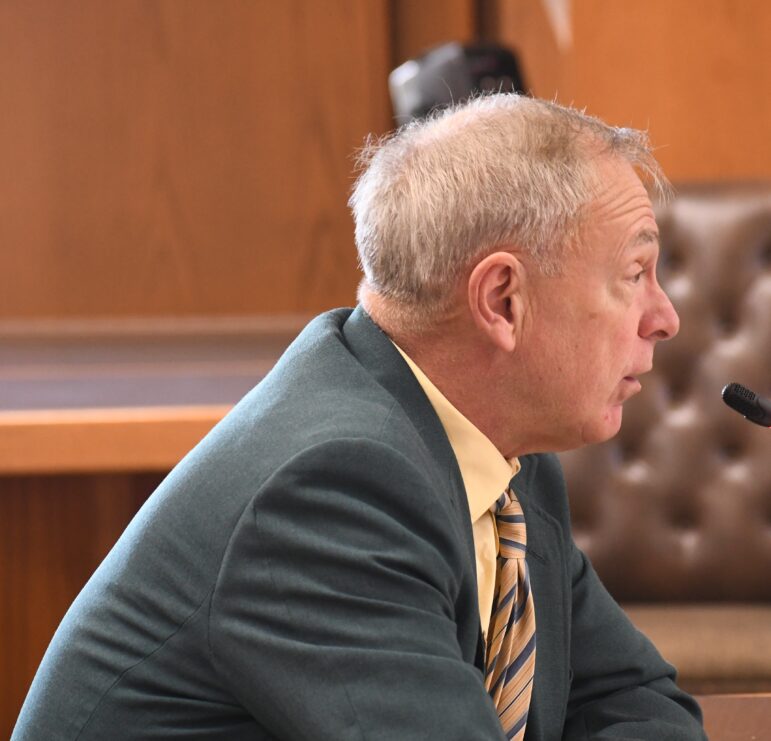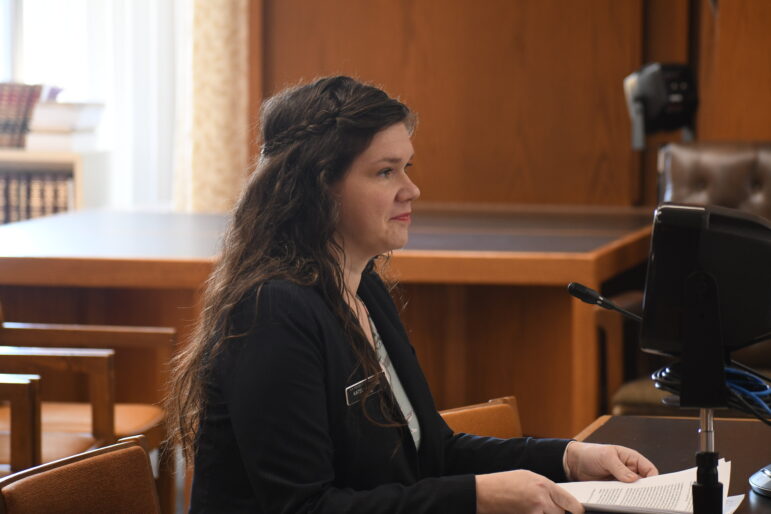
CONCORD, N.H. – On Wednesday in the New Hampshire House of Representatives’ Education Committee, legislators examined a bill that would require local school districts to devote at least one hour of instruction to teaching students about communism.
The bill, HB 102-L, was introduced by Michael Moffett (R-Loudon), Jose Cambrilis (R-Loudon), Deborah Hobson (R-East Kingston), and Valerie McDonnell (R-Salem). If passed, it amend RSA 189 by adding a new section that certifies the governing boards of any public or private schools in New Hampshire have taught at least one hour on the nature and history of communism to any student receiving a high school diploma. The bill language indicates that the instruction could take place during existing social studies courses.
Moffett said he introduced the bill due to concerns he had heard from parents and teachers regarding a lack of knowledge regarding communism among current students.
While Moffett said that there are other ideologies that also should be required instruction, it could be unwieldy to include an unlimited number of ideologies as required instruction within social studies curricula. However, he felt that discussion of communism was essential given the impact of the ideology on world history, its ongoing impact on world affairs and the incompatibility of its authoritarian nature with the American form of government.
Legislators expressed concerns with the feasibility of the bill such as whether students learning about communism in other states would meet that requirement, how much could actually be learned about such a broad concept within an hour, the impact of this bill on individualized education plans and whether oversight and accountability was possible.
“It’s sort of a broad brush of nothing,” said Stephen Woodcock (D-Conway)

There were also concerns on whether this bill would be superfluous to ongoing updates to social studies requirements being made by the New Hampshire Department of Education as well as the precedent this bill would set regarding the ability of local school districts to oversee their specific curricular needs.
Linda Tanner (D-Georges Mills) specifically expressed concerns over the bill being an unfunded mandate and whether that hour of instruction would have to be taken away from another topic.
Several individuals provided testimony in opposition to the bill, including Sebastian Fuentes of Rising Democracy NH.
Fuentes, like several members of the committee, applauded Moffett’s efforts to expand the number of topics learned by students. Echoing Moffett’s comment that several current members of the house lived under communist governments, Fuentes noted that he grew up in South America and had direct experience with communist and Marxist movements there. In light of Fuentes’ life experience, he said that it would be more important to provide instruction regarding white supremacy rather than communism since he felt that is a more immediate concern to today’s students.
HB 102-L was one of several bills discussed at the committee on Wednesday. Here is an overview on the discussion of those bills.
HB 71
Maureen Mooney (R-Merrimack), one of the sponsors of this bill, noted that it stemmed from a request by the New Hampshire Department of Education to remove a requirement regarding reports on charter school funding.
Mooney indicated that the information related to these reports are already available on the New Hampshire Department of Education website due to a 2016 law that was not specified.
HB 147
This bill would modify RSA 186:C3-b regarding membership on the New Hampshire Advisory Committee on the Education of Students with Disabilities.
The bill would modify language regarding correctional officers on the committee as well as adding a pediatrician onto the committee.
Katelyn Kuttab (R-Windham), the prime sponsor of the bill, said she would have preferred to require pediatricians with specializations related to disabilities within the modification of state law. However, she understood that it may be difficult to attract individuals to fill those positions if requirements were too restrictive, particularly given that membership on the committee is unpaid.

HB 103
Terry Roy (R-Deerfield) introduced this bill after learning of a constituent that works as an educator in one town in his district, but sought to serve on the board of a school within his district that was in another town.
Roy felt the constituent should be allowed to serve on that board as long as he recused himself on certain issues, such as the contact of the School Administrative Unit’s Superintendent that could impact both the constituent’s school where he works and the school board that he would serve on.
There was some confusion over language within the bill, with amendments expected. Advocates from various educational lobbying organizations indicated they would support the bill as long as it was more inclusive rather than restrictive for individuals seeking to run for school boards.
HB 168 and HB 155
These two bills related to surety bonds for vocational schools. Glenn Cordelli (R-Tuftonboro), the prime sponsor for HB 168, said he brought the bill forth due to a constituent who had difficulty starting a culinary school due to the prohibitive cost for a surety bond.
The amount of the bond, which would reimburse student tuition if a school goes bankrupt, would be 10 percent of the school’s income for the year or $10,000, whichever is greater.
HB 155 also addresses the amount of the bond for vocational institutions, which also removes language related to a higher education commission and also removes language for grants related to for-profit colleges and universities, as no for-profit college or university has existed in New Hampshire for the past five years.

HB 170
Deborah Hobson (R-East Kingston), the prime sponsor of the bill, introduced this legislation on behalf of a constituent seeking to introduce more children to multiplication tables and cursive handwriting.
The bill only changes one word in RSA 189:11c, removing “encouraged” and replacing it with “required” in regard to instruction of multiplication tables and cursive handwriting.
Hobson said that learning cursive helps students with disabilities, but could not provide examples.
Arlene Quartiello (R-Atkinson) felt that the change was too vague and David Luneau (D-Hopkinton) expressed concern about how this could impact individualized educational plans.
Woodcock also asked if Hobson would be amenable to splitting multiplication tables and cursive handwriting could be split into different bills. She replied that would be acceptable.
Testimony was largely in favor of the bill. Dr. Michael Gendry, a school board member from North Hampton, said he had met many students who were unable to read cursive handwriting and found that learning it helped their learning capabilities.
Lori Ball (R-Salem), said that over her 30 years in the field of education that learning cursive helped students. She noted that cursive teaches different types of fine motor skills and that Montessori Schools teach cursive to students as soon as 2 ½ years old.







